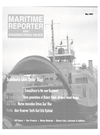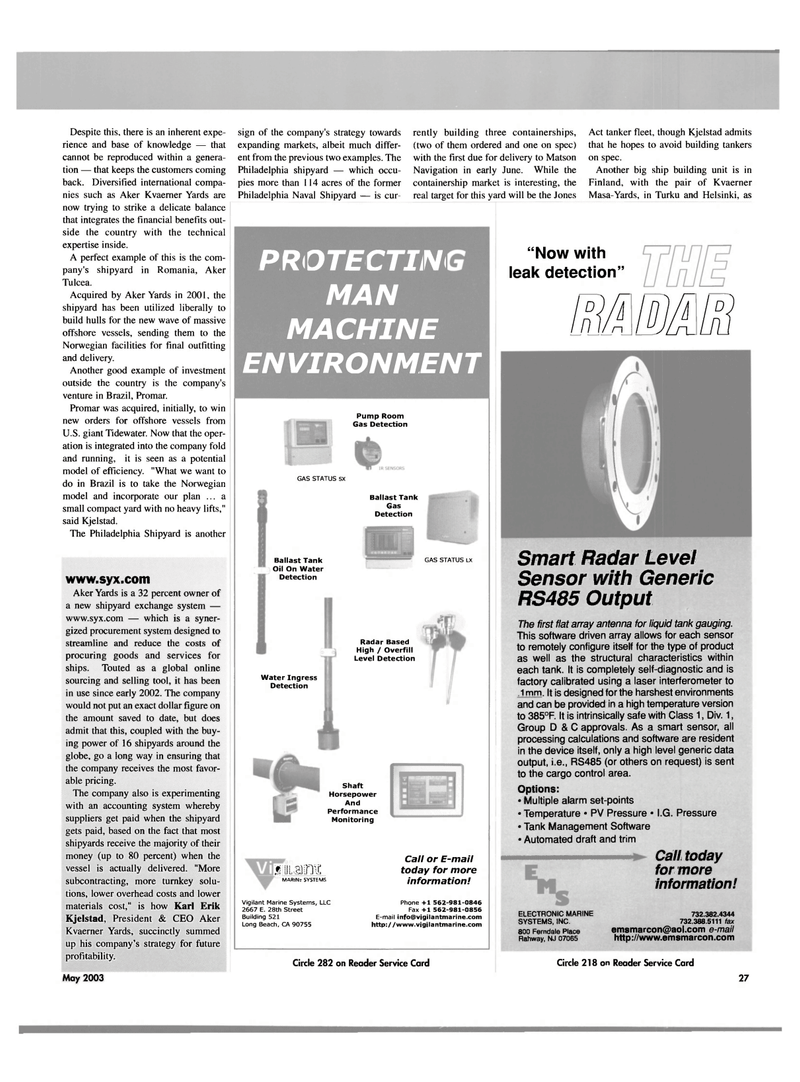
Page 27: of Maritime Reporter Magazine (May 2003)
Read this page in Pdf, Flash or Html5 edition of May 2003 Maritime Reporter Magazine
Despite this, there is an inherent expe- rience and base of knowledge — that cannot be reproduced within a genera- tion — that keeps the customers coming back. Diversified international compa- nies such as Aker Kvaerner Yards are now trying to strike a delicate balance that integrates the financial benefits out- side the country with the technical expertise inside.
A perfect example of this is the com- pany's shipyard in Romania, Aker
Tulcea.
Acquired by Aker Yards in 2001, the shipyard has been utilized liberally to build hulls for the new wave of massive offshore vessels, sending them to the
Norwegian facilities for final outfitting and delivery.
Another good example of investment outside the country is the company's venture in Brazil, Promar.
Promar was acquired, initially, to win new orders for offshore vessels from
U.S. giant Tidewater. Now that the oper- ation is integrated into the company fold and running, it is seen as a potential model of efficiency. "What we want to do in Brazil is to take the Norwegian model and incorporate our plan ... a small compact yard with no heavy lifts," said Kjelstad.
The Philadelphia Shipyard is another www.syx.com
Aker Yards is a 32 percent owner of a new shipyard exchange system — www.syx.com — which is a syner- gized procurement system designed to streamline and reduce the costs of procuring goods and services for ships. Touted as a global online sourcing and selling tool, it has been in use since early 2002. The company would not put an exact dollar figure on the amount saved to date, but does admit that this, coupled with the buy- ing power of 16 shipyards around the globe, go a long way in ensuring that the company receives the most favor- able pricing.
The company also is experimenting with an accounting system whereby suppliers get paid when the shipyard gets paid, based on the fact that most shipyards receive the majority of their money (up to 80 percent) when the vessel is actually delivered. "More subcontracting, more turnkey solu- tions, lower overhead costs and lower materials cost," is how Karl Erik
Kjelstad, President & CEO Aker
Kvaerner Yards, succinctly summed up his company's strategy for future profitability.
May 2003 sign of the company's strategy towards expanding markets, albeit much differ- ent from the previous two examples. The
Philadelphia shipyard — which occu- pies more than 114 acres of the former
Philadelphia Naval Shipyard — is cur- rently building three containerships, (two of them ordered and one on spec) with the first due for delivery to Matson
Navigation in early June. While the containership market is interesting, the real target for this yard will be the Jones
Act tanker fleet, though Kjelstad admits that he hopes to avoid building tankers on spec.
Another big ship building unit is in
Finland, with the pair of Kvaerner
Masa-Yards, in Turku and Helsinki, as
PROTECTING
MAN
MACHINE
ENVIRONMENT
Pump Room
Gas Detection
GAS STATUS SX
Ballast Tank
Gas
Detection
Ballast Tank
Oil On Water
Detection
GAS STATUS LX
Radar Based
High / Overfill
Level Detection
Water Ingress
Detection
Shaft
Horsepower
And
Performance
Monitoring mmm
MARINE SYSTEMS
Vigilant Marine Systems, LLC 2667 E. 28th Street
Building 521
Long Beach, CA 90755
Call or E-mail today for more information!
Phone +1 562-981-0846
Fax +1 562-981-0856
E-mail [email protected] http://www.vigilantmarine.com
Circle 282 on Reader Service Card "Now with leak detection" mm®
Smart Radar Level
Sensor with Generic
RS485 Output
The first flat array antenna for liquid tank gauging.
This software driven array allows for each sensor to remotely configure itself for the type of product as well as the structural characteristics within each tank. It is completely self-diagnostic and is factory calibrated using a laser interferometer to •1mm. It is designed for the harshest environments and can be provided in a high temperature version to 385°F. It is intrinsically safe with Class 1, Div. 1,
Group D & C approvals. As a smart sensor, all processing calculations and software are resident in the device itself, only a high level generic data output, i.e., RS485 (or others on request) is sent to the cargo control area.
Options: • Multiple alarm set-points • Temperature • PV Pressure • I.G. Pressure • Tank Management Software • Automated draft and trim
Call today for more information!
ELECTRONIC MARINE
SYSTEMS, INC. 800 Ferndale Place
Rahway, NJ 07065 732.382.4344 732.388.5111 fax [email protected] e-mail http://www.emsmarcon.com
Circle 218 on Reader Service Card 27

 26
26

 28
28
